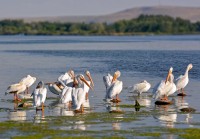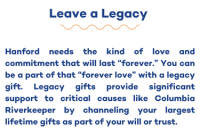Sustaining Gifts Director Dianne Riley reflects on her personal history with activism.
Where Grief and Hope Can Coexist
Hope locates itself in the premises that we don’t know what will happen and that in the spaciousness of uncertainty is room to act.
In 1982 I took my first foray into political activism, attending the Rally for Nuclear Disarmament in New York City. A friend and I were the youngest among a loosely organized group of Midwesterners who traveled by school bus through most of the day and night to Manhattan. I remember being relaxed yet energized walking down to join the throng in Central Park. We never made it that far. Every street in midtown was clogged with one million protesters from across the country and around the world, shoulder to shoulder, chanting, singing, voices echoing off buildings. We shared food, hugs, and tears with strangers. To swim in that sea of humanity and experience the expression of our calm determination was to plumb the depths of collective grief co-mingling with hope.

In the years since, my fear of nuclear destruction has shifted substantially, but it remains just as motivating. Progress toward limiting nuclear armament around the world has happened largely under the radar of common knowledge and public discourse in the U.S.
Last summer, I joined the Hanford Journey, a day-long event organized by Yakama Nation in collaboration with Columbia Riverkeeper. In the months after, I debriefed with participants to see what the takeaways were. Generally speaking, we shared a sense of how daunting it is to contemplate “cleanup.” For example, considering the estimated 25,000 years required to babysit what is currently 56 million gallons of nuclear waste, does it make sense to expect success that far in the future?
To think about managing nuclear waste is to confront the limits of our civilization. It is an exercise that drifts quickly into the unknown and unknowable. Recently, I came across an essay by writer, historian, and activist Rebecca Solnit that lifted up these limitations as opportunity—an opportunity to act.
Solnit writes:
Hope locates itself in the premises that we don’t know what will happen and that in the spaciousness of uncertainty is room to act. When you recognize uncertainty, you recognize that you may be able to influence the outcomes—you alone or you in concert with a few dozen or several million others. Hope is an embrace of the unknown and the unknowable, an alternative to the certainty of both optimists and pessimists.
[...]
It is the belief that what we do matters even though how and when it may matter, who and what it may impact, are not things we can know beforehand. . . .history is full of people whose influence was most powerful after they were gone.
-Rebecca Solnit, writer, historian, and activist
I find that the sober certainty that we will all someday be gone is perfectly counterbalanced by the fact that I don’t really know what death is or where it takes us. Th is potent combination of certain and uncertain parts of human experience is ripe for the type of action that is legacy giving. Why not hope that you matter and your life makes a difference? I appreciate Solnit’s approach: let us dream our hopes into this space of uncertainty so that at least some of us might find out down the line that such dreams acted upon are powerful enough to recreate our world anew.
Get started:
Contact: Dianne Riley | dianne@columbiariverkeeper.org | 541-399-3260.
Learn more
To ensure the complete and timely cleanup of the Hanford Nuclear Site, we review and critique cleanup and restoration plans.
The fight to clean up the most polluted place in America.
Add your voice to the growing number of people holding the U.S. government accountable for decades of nuclear-waste pollution.
Want to hear all the stories from Columbia Riverkeeper's Currents Issue 1, 2023 Newsletter?



